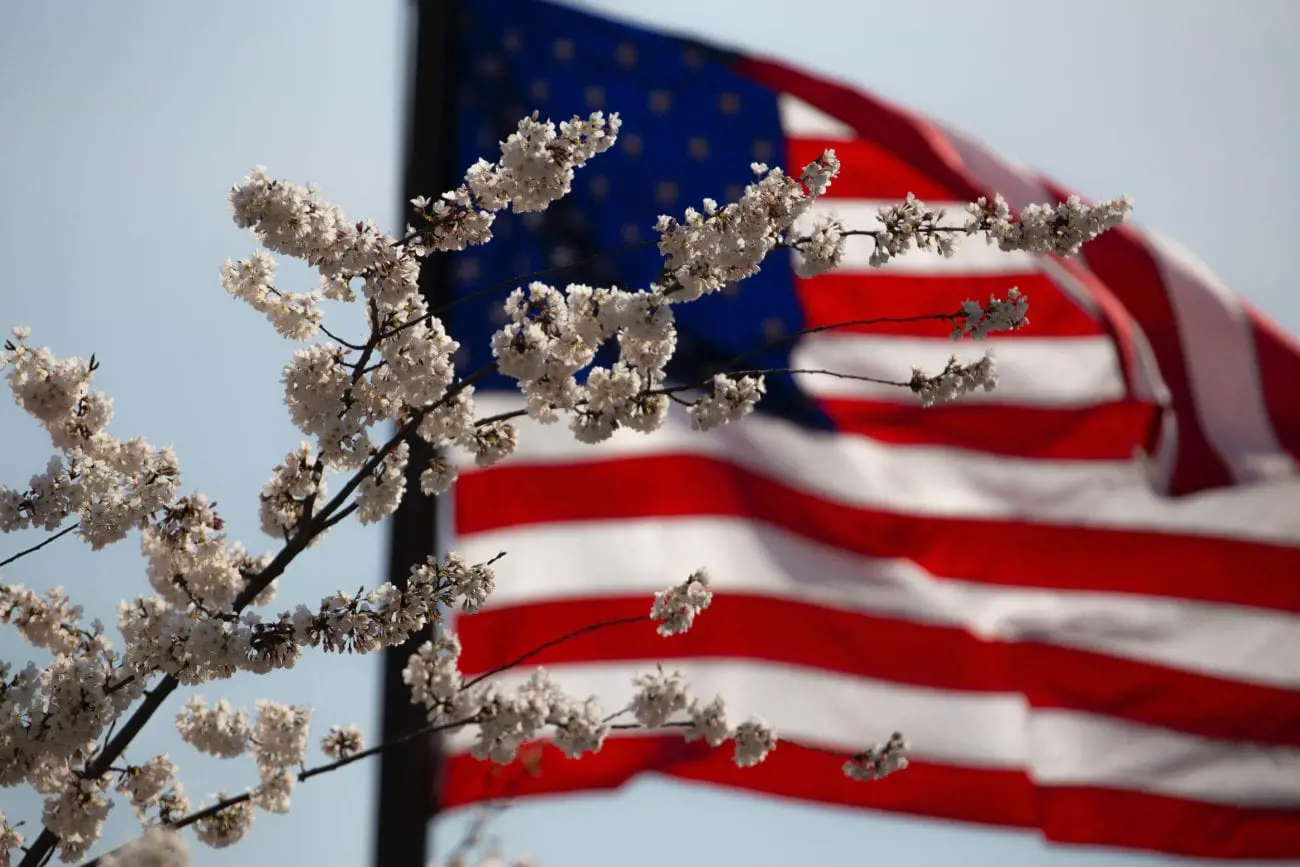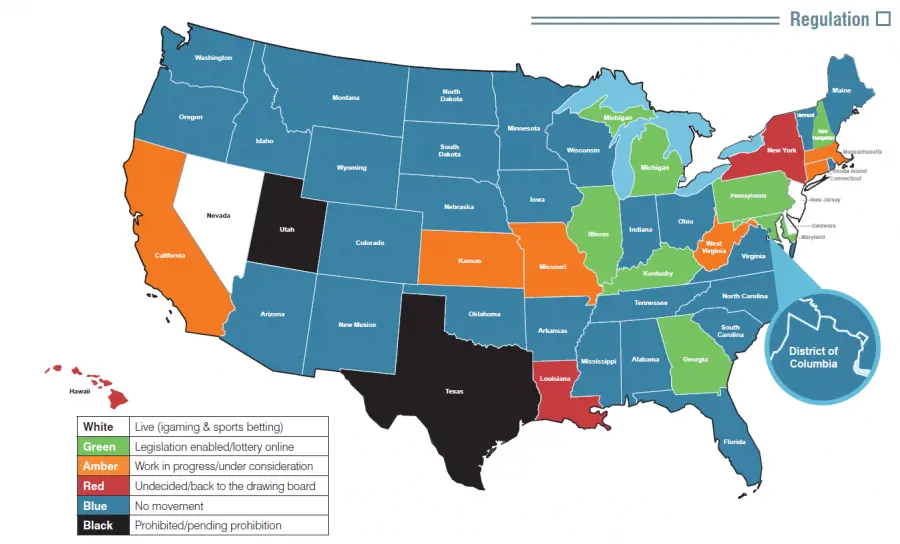State of the Union: Tennessee, Ohio, Montana and more
This week's State of the Union, in partnership with Segev LLP, looks at new developments in Tennessee, Ohio and Montana, as well as reporting on the performances of the regulated New Jersey and Pennsylvania markets.

This week's State of the Union, in partnership with Segev LLP, looks at new developments in Tennessee, Ohio and Montana, as well as reporting on the performances of the regulated New Jersey and Pennsylvania markets.
Tennessee bill now online-only A bill that would legalise sports betting in Tennessee has been amended so that only online sports wagering would be permitted in the state.
Introduced in January by Representative Rick Staples, HB0001 originally set out plans to open shops similar to sportsbooks in Tennessee, in addition to internet betting services.
However, after discussion this week in the House’s State Committee, Staples has opted to remove land-based sportsbooks from the bill and instead focus on an online-only market. Wagers would also be permitted via an approved mobile platform.
Should the bill come into law, Tennessee would become the first state in the US to offer only internet sports betting to consumers. New Jersey is currently the only state to have both legal land-based and online sports wagering service available.
The Tennessee Sports Gaming Act also includes measures that would see licence-holders pay tax at a rate of 10% on adjusted gross income.
Licences to offer legal sports betting in Tennessee would cost operators $7,500 (£5,680/€6,600). A separate licence would be required for each sportsbook in the state.
Consumers would need to be at least 21 years old to place a sports bet and also be physically located inside the state’s boundaries.
Eklund and O’Brien file sports betting bill Lawmakers in Ohio are to run the rule over a new bill that could lead to the state legalising land-based and online sports betting.
Sponsored by Senators John Eklund and Sean O’Brien, SB111 would permit the state’s 11 casinos and racinos to offer legal sports wagering to consumers in Ohio.
SB111, the first sports betting bill introduced in the Ohio Senate in the current legislative session, sets out measures that would allow for remote sign-up for players.
Venues that want to offer sports betting services would need to pay a licence fee of $100,000 (£75,500/€88,300). Licensees would be able to enter partnerships with operators in order to offer sports wagering.
Casinos and racinos that secure a licence would be subject to a tax rate of 6.25% on gross sports betting revenue. However, the bill omits any language relating to a so-called ‘integrity fee’ for professional sports leagues.
Montana bill heads for committee hearing Lawmakers in Montana are to consider a new bill that would legalise land-based, online and mobile sports betting in the state.
SB 330, also known as the Montana Sports Betting Act, is scheduled for a hearing with the Senate’s Business, Labour, and Economic Affairs Committee on March 19.
The bill sets out provisions for operators to offer an interactive sports wagering platform via a website or a mobile device to consumers located inside the premises of a licensed gambling facility.
Licences would cost an initial $1,000 (£754/€880), while operators would also need to pay an annual renewal fee of $1,000. Sports wagering licences would expire on June 30 of each year.
Operators that secure a licence would be permitted to work with a third-party in order to run a sports betting platform in the state. Such partnerships would be covered by an associated gambling business licence, which would permit the leasing of sports betting equipment, systems, or other items necessary to offer sports wagering.
All licensed sportsbook operators would be subject to a tax rate of 8.5% of their adjusted gross betting receipts, less winnings paid and payments to the federal government as federal excise tax.

New Hampshire betting bill progresses to Senate New Hampshire is a step closer to regulated sports betting after a bill that would legalise such activities in the state advanced to the Senate.
The New Hampshire House of Representatives has passed an amended version of House Bill 480 by a vote of 269-82, with the bill now moving forward to the Senate for further discussion.
Should the bill come into law, consumers would be able to place bets at various retail locations across the state, as well as via online and mobile platforms. The New Hampshire Lottery Commission would be responsible for regulating the market.
The current version of the bill does not clarify how much the licences would cost, nor the level of tax sports betting operators would face. However, a fiscal note on the bill suggests sports wagering could generate up to $7.5m (£5.7m/€6.6m) in revenue during the first year of regulation.
New Jersey gaming revenue grows to $241.2m The New Jersey Division of Gaming Enforcement (DGE) has reported a 25.6% year-on-year increase in gaming revenue in February, though the contributions from igaming and sports betting fell sequentially.
Total gaming revenue for the month grew to $241.2m (£181.9m/€213.2m), with the majority of the total coming from land-based gaming. The channel accounted for $196.7m of February’s total - up 15.7% - comprising $139.6m of slot machine revenue and $57.1m from table games.
iGaming revenue, meanwhile, was up 44.4% year-on-year to $31.7m, though this represented a 5.5% decline from January.
Looking to sports betting, February revenue came in at $12.7m. While there is no prior year comparison, as legal wagering did not launch in the state until June 14, 2018, the monthly total represents a 32.2% month-on-month decline from January, which included the National Football League (NFL) playoffs.
Pennsylvania wagering revenue falls in February Sports betting revenue in Pennsylvania fell by 25.4% month-on-month in February despite the state’s handle only falling slightly, according to the latest figures released by the Pennsylvania Gaming Control Board (PGCB).
Pennsylvania’s sports wagering handle totalled $31.5m (£23.7m/€27.7m) last month, compared to January’s record figure of $32m and almost double the $16.2m posted in December.
However, sports betting revenue slumped from $2.61m in January to $1.95m in February as a result of player winnings. Pennsylvania was able to take $700,850 in tax from sports wagering activities during the month.
The decline in both revenue and handle, albeit the latter only being a slight drop on the previous month, comes despite the NFL’s showpiece Super Bowl event taking place in February.
NY Governor unsure of online wagering New York Governor Andrew Cuomo has again professed his reluctance to consider online and mobile wagering in the state.
Speaking to public radio network WAMC, Cuomo said he was “not a fan” of permitting sports betting outside of casino walls.
New York is set to open a public consolation on regulations for sports betting, which only permit in-person wagering at the state’s tribal and commercial casinos. Under these regulations, which impose an 8.5% tax rate on the venues’ sports betting revenue, racetracks, racinos and off-track betting facilities will remain banned from offering sports betting.
Professional sports teams throw weight behind Missouri bill Missouri-based sports teams the St Louis Cardinals and Kanas City Royals have voiced support for a proposal to legalise sports betting in the state. HB119, filed by Representative Cody Smith would permit online and in-person sports betting, with licensees taxed at 6.25% of gross revenue. Applicants will pay a fee of $10,000, followed by an annual administrative fee of $5,000 if their application is successful. Licences will last for five years, after which operators must pay an additional $10,000 for their certification to be assessed for renewal.
The bill had its first reading in the Missouri House of Representatives in January, with a public hearing held earlier this month. That hearing saw a representative from Major League Baseball testify in favour of the proposals. The bill is to be scrutinised by the House General Laws Committee before it can progress further.